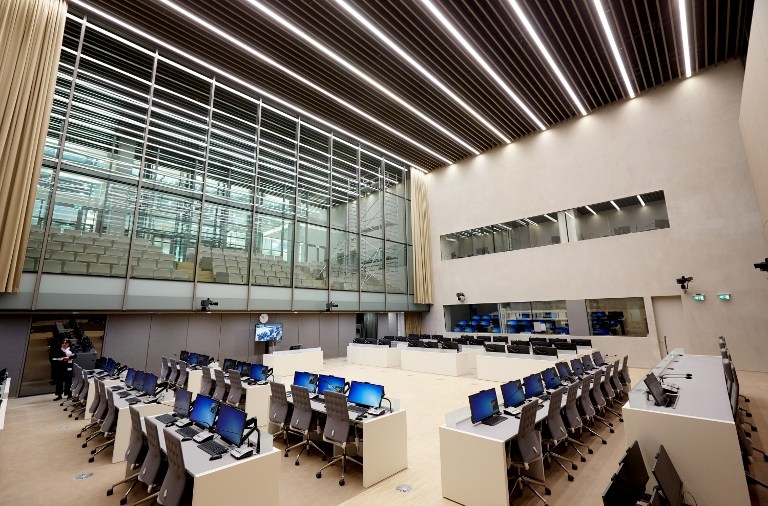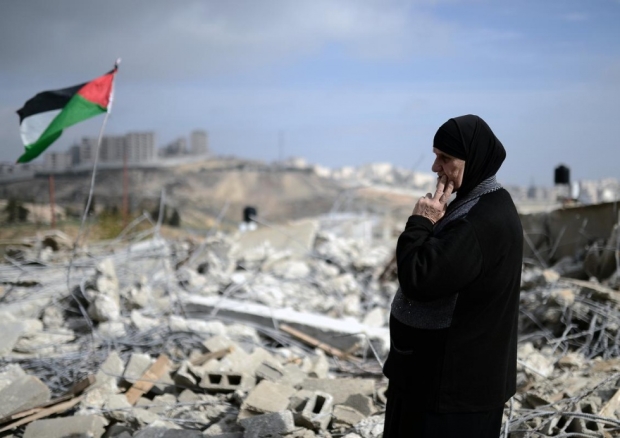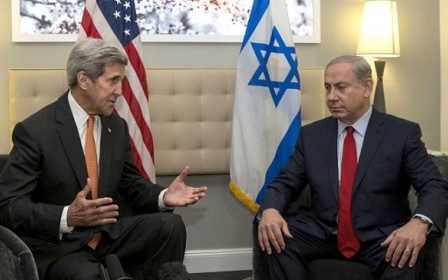Should the Palestinians seek justice at the International Criminal Court?

There is little doubt that the mid-February Netanyahu-Trump love fest at the White House further dampened already dim Palestinian hopes for a sustainable peace based on a political compromise.
The biggest blow was President Trump’s casual abandonment of the two-state solution coupled with an endorsement of a one-state outcome provided the parties agree to such an outcome, a result almost impossible to imagine.
It would seem a no brainer for the PA to light up the skies of public awareness of the Palestinian plight by vigorously demanding justice at the International Criminal Court (ICC)
With geopolitical bravado suitable for the real estate magnate that he remains, despite presidential manoeuvrings, Trump also vaguely promised to negotiate a grand deal for the region that evidently reached beyond the contested territory of Palestine so long locked in conflict, and encompassing neighbouring countries or possibly the whole region.
It is easy to speculate that such murmuring by Trump was not welcomed in either Jordan or Egypt, presumed dumping grounds for Palestinians in the West Bank and Gaza to ensure that Israel maintains a comfortable Jewish majority if the one-state solution were ever forcibly implemented.
An inflammatory part of this new context is the accelerated expansion of the existing network of unlawful Israeli settlements located in occupied Palestine. Although near unanimously condemned in a Security Council resolution in December, Israel has defiantly announced approval of thousands more settlement units, endorsed plans for an entirely new settlement and, by Knesset initiative, provocatively legalised settlement "outposts", 50 of which are distributed throughout the West Bank in direct violation of prior Israeli law.
Trump throws down the gauntlet to the Palestinian Authority
It is possible that the Israeli Supreme Court will heed anticipated judicial challenges to this latest move, and eventually void this Knesset law, but even if this happens, the passage of such a law sends a clear message of iron resolve by the political forces currently steering Israeli policy never to permit the establishment of a viable Palestinian state.
Light up the skies
In these circumstances, it becomes incumbent upon the Palestinian Authority to show the world that it is still alive, and it has few ways of doing this. From such a perspective it would seem a no brainer for the PA to light up the skies of public awareness of the Palestinian plight by vigorously demanding justice at the International Criminal Court (ICC).
A favourable outcome at the ICC would still be of great value for the Palestinians. It would cast Israel in an unfavourable light in relation to the UN, international law, and world public opinion
After all, there is a wide consensus on the global stage that all the settlements, and not just the outposts, are in violation of Article 49(6) of the Fourth Geneva Convention. These settlements have for decades acted as a major obstacle in the search for a satisfactory diplomatic solution of the conflict.
Of course, it would be naive to expect Israel to comply with an adverse judgment of the ICC, or to participate in such a proceeding in any way other than by challenging the competence of the tribunal.
But a favourable outcome would still be of great value for the Palestinians. It would cast Israel in an unfavourable light in relation to the UN, international law, and world public opinion and, undoubtedly, encourage the growth of the global solidarity movement.
Yet, despite these circumstances that make the ICC seem such an attractive option, a PA decision to take this path is far from obvious. Last week, former foreign minister of the PA and member of Fatah’s central committee, Nasser al-Kidwa, effectively dismissed the ICC option telling Middle East Eye that it was "complicated" without any further explanation.
Senior Palestinian official admits no new plan to tackle Israeli settlements
There are mixed signals emanating from Palestinian leadership circles. The PLO secretary general, Saeb Erekat, in contrast to Kidwa, minced no words in his insistence that the ICC investigate “the colonial settlement regime".
It seems useful to speculate on why there should be this ambivalence among Palestinian leaders. After all, both international law and public opinion seem to side strongly with the Palestinians. Israel is defiant, and shows every sign of further expansion.
At bottom of this debate is the tricky question as to whether deference to the vagaries of geopolitics serves Palestinian interests at this time.
Weighing the pros and cons
The case for recourse to the ICC is rather obvious. It would back Israel into a corner. The Netanyahu government is certain to react with anger and hostility to any such move by the PA. Such a reaction would be widely seen as strong confirmation of Israel’s vulnerability to any impartial test as to whether its settlement policies meet the minimum requirements of international law.
Recourse to the ICC would help restore support for the flagging claims of the PA to serve as the sole legitimate representative of the Palestinian people
And most importantly for the PA, it would demonstrate that despite recent political disappointments, the Ramallah leadership was prepared to pursue a controversial course of action that displayed political courage, including a willingness to endure expected vindictive acts of reprisal.
The PA should take Israel to the ICC over illegal settlement bill
Recourse to the ICC would play well with the Palestinian people, especially those living under occupation. They experience daily tensions with violent settler groups and see no future for themselves absent confrontation with Israel. If the PA chooses such a course, it would help restore support for the flagging claims of the PA to serve as the sole legitimate representative of the Palestinian people.
The arguments against going to the ICC are somewhat more elusive. There is no doubt that Palestine, recognised by the UN as a state, now enjoys the jurisdictional qualifications to participate in ICC proceedings. What is less clear is whether the ICC would be responsive.
During its 15 years of operation, the ICC has been very reluctant to be proactive except in Africa, and even there it has been stung by an intense pushback by African governments and African Union. The ICC has been reluctant to stir up political opposition in the West, which would certainly occur if the ICC launched a full investigation of Palestinian criminal grievances against Israel.
The ICC has been reluctant to stir up political opposition in the West, which would certainly occur if the ICC launched a full investigation of Palestinian criminal grievances against Israel
Although a setback for the PA, such an outcome at the ICC would be internationally criticised as contrary to reasonable interpretations of international law, and be widely regarded as a reflection of political pressures exerted by Washington.
Probably, the PA is most inhibited by the "lawfare" campaign being waged by Israel and the United States against it. Already during the Obama presidency, Congressional legislation was passed terminating financial assistance to the PA in the event of any recourse to the ICC.
Since Trump, these warnings have escalated, including the total suspension of financial aid, the closing of the PLO offices in Washington, and threats to put the PLO and Fatah back on the US list of terrorist organisations. It is evident that the PA is taking these unseemly threats seriously.
Abbas blocked ICC application. Why?
There are also PA fears that any ICC initiative would induce Israel to move more quickly toward closure with respect to the underlying conflict, annexing most or all of the West Bank. Such a reaction would be in keeping with Israel’s tendency to respond disproportionately to any formal action directed at the legality of its policies and practices. Israel is particularly sensitive about war crimes charges.
Now that Netanyahu can count on unconditional support in the White House and the US Congress, it would not be surprising to see him seize the occasion of an ICC initiative to proclaim Israeli sovereignty over the whole of historic Palestine.
PA paralysis
Given this context, it seems almost certain that the PA will not act take advantage of the ICC option. The PA is likely to adopt a posture of neither/nor, that is, neither explicitly ruling out recourse to the ICC, nor activating the option.
The PA is likely to adopt a posture of neither/nor - neither explicitly ruling out recourse to the ICC, nor activating the option
This reflects the reality that the PA is caught between the rock of American and Israeli bullying tactics and the hard place of an increasingly restive Palestinian population, acutely reminded of its ordeal by the grim realisation that 2017 is the 50th anniversary of the Israeli occupation.
The US posture, although somewhat more belligerently pro-Israel as a result of the Trump presidency, is nothing new. Even during the Obama presidency it opposed every attempt by the PA to rely on international law to advance its national struggle.
Instead of welcoming the use of law rather than weapons, the US government castigated efforts of Palestine to gain membership in the UN system or to seek relief for its grievances in international venues. This turn against international law, as well as the UN, is clearly a signature issue for the Trump presidency, and not just in relation to Palestine. This is not good news for the world.
- Richard Falk is an international law and international relations scholar who taught at Princeton University for 40 years. In 2008 he was also appointed by the UN to serve a six-year term as the Special Rapporteur on Palestinian human rights.
The views expressed in this article belong to the author and do not necessarily reflect the editorial policy of Middle East Eye.
Photo: The International Criminal Court (ICC) building in The Hague, The Netherlands (AFP)
This article is available in French on Middle East Eye French edition.
New MEE newsletter: Jerusalem Dispatch
Sign up to get the latest insights and analysis on Israel-Palestine, alongside Turkey Unpacked and other MEE newsletters
Middle East Eye delivers independent and unrivalled coverage and analysis of the Middle East, North Africa and beyond. To learn more about republishing this content and the associated fees, please fill out this form. More about MEE can be found here.






